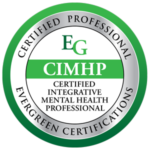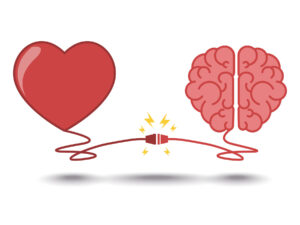Mind. Body. Spirit.
Caring for Your Mind and Body Heart Health-Understanding the Connection
Blog By: Mind, Mouth and Movement: Connecting the Missing Links
By Nancy Lum, RDN and Dawn O’Meally LCSW-C, P.A. 
Heart disease is the #1 cause of death in the United States and worldwide as well. According to the World Health Organization (WHO), over 17 million people die every year from cardiovascular disease. You probably already know the risk factors that lead to heart disease, but did you know the role that your mental health plays a role in it as well?

Heart Disease and Mental Health
While depression and anxiety do not likely directly cause cardiovascular disease, there is a mind-body connection. Research has shown that mental health has a physiologic effect on the body, including increased cardiac reactivity such as increased heart rate and blood pressure, reduced blood flow to the heart, and heightened levels of cortisol (a stress hormone). High blood pressure or hypertension is the leading cause of heart attacks and strokes. When stressed, the body releases adrenaline and cortisol to help us, but too much stress for too long, can lead to changes that effect heart health. With untreated or undertreated stress or anxiety, we may not be reaching for healthy foods and instead are reaching for foods or substances to self soothe that promote Diabetes, High Cholesterol, and Obesity-all of which lead to heart disease. Lack of motivation, sadness, and desire associated with depression may contribute to a sedentary lifestyle, inadequate self-care, and poor management of health issues-all of which can increase risk factors for the development of heart disease.
Research has shown that people with serious chronic mental illnesses such as Bipolar Disorder, Schizophrenia, and Schizoaffective Disorder die 10-20 years sooner than the general public and the leading cause of death was cardiac disease. Why? Risk factors for cardiovascular disease helped explain the reason as those with serious mental illnesses were more likely to be current smokers and to have obesity, diabetes or high blood pressure. In addition, many classes of medications used to treat chronic mental illnesses can contribute to weight gain, increased cholesterol, and blood sugar issues-segways to cardiovascular disease.
Takotsubo cardiomyopathy (broken-heart syndrome) is a real diagnosis. According to Harvard Health Publishing, “Takotsubo cardiomyopathy is a weakening of the left ventricle, the heart’s main pumping chamber, usually as the result of severe emotional or physical stress, such as a sudden illness, the loss of a loved one, a serious accident, or a natural disaster such as an earthquake. That’s why the condition is also called stress-induced cardiomyopathy or broken-heart syndrome. The main symptoms are chest pain and shortness of breath.” Research has shown that women experience broken-heart syndrome more than men. Yes, our bodies respond to stressors! The good news is that the associated cardiac changes usually resolve within a month or two following the stressor.

Lastly, it is important to know that up to 20% of people that have had a heart attack develop depression afterwards. People suffering with depression after having a heart attack, stroke, or heart failure have a lower chance of recovery and a higher risk of death than people without depression. This underscores the need to have both the resultant depression and heart disease treated to promote a better outcome.
How can you improve your heart health and mental health?
Though not exhaustive, check out the list below:
- Get your depression, anxiety, trauma, grief evaluated and treated by a licensed mental health professional.
- Learn and practice stress management strategies (progressive relaxation, meditation, breath work, yoga, hobbies, connect with spirituality, music, etc.)
- Address your health risk factors (diabetes, obesity, high blood pressure, tobacco and alcohol usage). Become proactive vs. reactive about your health.
- Eat healthfully. Consult with a licensed registered dietician if needed.
- See your primary care medical professional annually and find out your numbers (blood pressure, glucose, cholesterol, etc.).
- Take all your medications as prescribed by your physician(s). Don’t try to be your own doctor, and don’t rely on Dr. Google.
- Get good sleep (7-9 hours every night). If you are overweight or obese, sleep apnea should be evaluated and treated.
- Become more physically active. Exercise works as well as Prozac in relieving depression. Get the support of a certified personal trainer if needed.
- Connect with your family and friends.
- Make small lifestyle changes and habits-one at a time. (Atomic Habits is a great book.)
- Identify and deal with negative self-talk, excuses, rationalizations, self-defeating habits and behaviors contributing to undesirable mental health and health outcomes.
- Practice self-compassion and self-kindness. Remember-Rome was not built in a day!

Heart Disease and Nutrition
Your heart is an amazing organ and is responsible for pumping 2000 gallons of oxygenated blood throughout your entire body every day and beats 72 times a minute. Getting plenty of water (64+ ounces daily) is extremely important to remain hydrated. Dehydration will impede your blood flow and can make your heart have to work much harder at pumping the blood. Exercise daily is essential in maintaining the oxygen in your blood which will reach your brain and help you think more clearly. Not enough oxygen to the brain leads to what we call mental fog and fatigue. The heart can cause us to experience profound feelings. Research suggests that the heart is a sensory system, able to learn, make decisions, and is highly perceptive, but may be a very clever data and processing center as well.
Nutrition and exercise play big roles in heart health. Fatty liver disease can be a precursor to heart disease so maintaining a healthy weight by making good food decisions and moving the body daily to prevent fatty liver disease and have a healthy heart go hand in hand. When your liver is not functioning well it causes 500 biological functions to be thwarted, heart functions included. The portal vein brings in nutrient rich blood from the digestive system and then the hepatic artery carries oxygenated blood from the heart.
- Making healthy food decisions means to include healthy fats into the food plan such as olive/avocado oils, avocados, nuts, seeds, nut butters, fatty fish, seeds, and ground flaxseed and chia seeds which are all great choices to increase the omega 3 fats. Increasing omega 3 fats will help reduce inflammation and total cholesterol.
- Decreasing intakes of saturated fat by removing butter and replacing with nut oils like olive and avocado.
- Purchasing leaner meats (85-97%), and consuming light and low-fat condiments and dairy products.
- Increasing meals with fish especially wild caught fatty fish like salmon, mackerel, and sardines.
- Adding a daily vegetarian meal containing, beans, soybeans, and or lentils.
- Lowering egg yolks to 5 a week. Egg whites can be much higher as the saturated fat and vitamin A are in the yolk and the protein is in the white part of the egg.
- Increasing fresh and frozen fruits and vegetable servings per day.
- Utilizing whole grain high fiber starch/grain products will increase daily fiber intake to also help lower cholesterol and provide other health benefits such as decreasing constipation, cancer prevention and so on.
- The two most important things to do to lower cholesterol is to decrease sweets/sugar and simple carbohydrates such as white, bread, pasta, rice, white rolls, chips, candy, cake, ice cream and limit drinking alcohol.
- Finally purposeful exercise at least 150-300 minutes a week of moderate cardiovascular activity such as; brisk walking, elliptical machines, biking, swimming or 75-150 minutes of vigorous activity that is more high intensity like HIIT training and running.
We have many things we can do with our lifestyles to combat heart disease and turn down the expression of those heart disease genes to have better long-term outcomes.